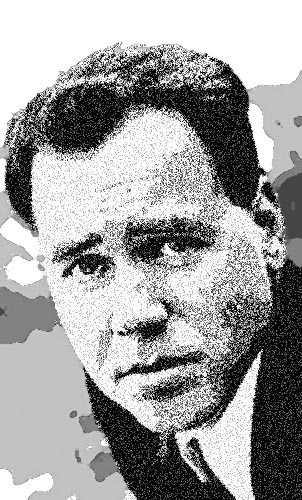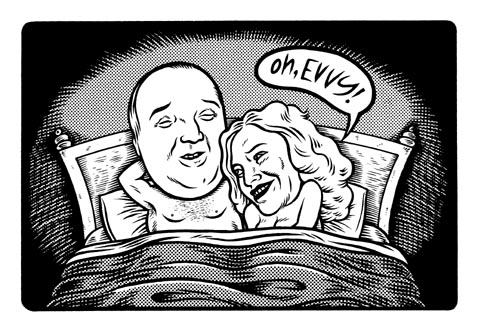 Something occurred to me recently that's probably occurred to millions of people over the last decade and a half, but I'll bore you with it anyway, like someone who's just discovered Tarantino or olives or spanking, and wants to sing their praises in that constricted corridor of opportunity between Zeitgeist and retro.
Something occurred to me recently that's probably occurred to millions of people over the last decade and a half, but I'll bore you with it anyway, like someone who's just discovered Tarantino or olives or spanking, and wants to sing their praises in that constricted corridor of opportunity between Zeitgeist and retro.The Net and the Web both take their names from similar structures (in Dr Johnson's words, a "reticulated, decussated fabric with interstices at intersections"). Fair enough. But the energy-efficient lightbulb that sputtered to life above my scalp heralded another metaphorical connection. Nets and webs are united not just in form, but in function. They trap; they ensnare; they imprison.
What kickstarted this thought process was reading Victor Pelevin's The Helmet of Horror (Canongate), which reworks the myth of Theseus and the Minotaur through the medium of an online conversation. So far, so Web 2.0/dead tree interface, and we've been here several times before, most recently with the Japanese Train Man phenomenon. Oh look, someone's updated the epistolary novel for a new level of technology. Again. But Pelevin adds some neat twists of his own: the 'characters' don't know where they are, or how they came to be there; they just about know who they are, but any attempt to communicate their identities to their fellow prisoners is ruthlessly ****-ed out by invisible censors. They don't even choose their own log-in names. Gradually, as they swap snippets of various half-recalled and revealed myths, they realise that they're in some kind of Labyrinth, described thus:
"Some accounts say it was a beautiful place with lots of corridors and rooms, according to others it was a foul-smelling cave with numerous branches plunged into eternal darkness. Or it could be that different cultures had different impressions of the same place."
Which sounds like the Babelbabble that accompanies any analysis of the Web, the true believers always balanced out by the tabloid scare stories written by people who've watched one AOL commercial too many. The site they're all accessing is based on the design of a certain British newspaper's Web presence, a fact that brings together notions of digital and religious control: "Our Guardian really is unlimited."
The author throws multiple literary references into the bubbling pot, from Pirandello-style metafiction (a character called Romeo is encouraged to "take a pump-action shotgun and go looking for your Shakespeare") to that old sci-fi standby, the virtual reality helmet, which here becomes inextricably linked to the headgear in which Theseus tracks down the Minotaur, and leads to a neat little diversion on the notions (illusions?) of choice and interactivity that underpin Web 2.0:
"Nutscracker
Well, imagine you decide for yourself who's going to shoot who when you're watching an action movie. If you decide the main hero gets killed in the first shootout, then what happens to the rest of the plot? If you had genuinely free choice, the results could be pretty miserable. But art is supposed to make us happy, not miserable.
Monstradamus
That's for sure. And even when it does makes us miserable, we should feel happy in our misery.
Nutscracker
That's right! So there never is any genuine interactivity, only the appearance of it. Or rather, it is permitted, but only within a narrow range where no choice you make can change the fundamental situation. The main problem is to eliminate freedom of choice so that the subject is led unerringly to make the decision required, while at the same time maintaining his firm belief that his choice is free."
It's this engagement that makes The Helmet of Horror my book of the year. I thought it might be Douglas Coupland's JPod, which is very funny, but despite its geeky textures, isn't actually about online existence. It's really about dysfunctional families and studied irony, which is to say, it's about Douglas Coupland. The inmates of Pelevin's mazy mind are good with the one-liners, but they don't really have time to conjure up stuff like "Mom, Kam Fong's head of a Chinese people-smuggling syndicate. He doesn't have time to be Dad's secret gay lover." Instead, they unite against the unseen enemy, joining a protective chorus of half-understood Latin and wailing, wordless vocalese, as primal and universal as Joyce's "Introibo ad altare Dei" and Eliot's "Wallala leilala". Post-post-modernism does a backflip and splashes down in the primitive myths that bubbled under the surface of Modernism. Despite the hype, nothing is truly new.
Pelevin's ideas force me to ponder this quasi-reality that we've built up in the last few years. The otaku who inhabit the universe of Train Man stick to online existence because only there do they feel safe; but we know that, shrouded in anonymity, plenty of people delight in making the virtual world an unpleasant or even threatening place. Pelevin creates a universe that out-Sartres Sartre: not only is Hell other people, but you can't see the other people, don't know their names, don't even know if they exist. And this isn't just an online phenomenon. You might be the Person of the Year, but when was the last time that You, for example, managed more than an embarrassed nod of greeting to your next-door neighbour (who is also You)?
Since I've been indulging in Cultural Snow, I've encountered some of the funniest, wisest people I've ever known. I say 'encountered' and 'known', although I've only met a handful of them in what still remains the real world, and one of my resolutions for 2007 (along with shedding the weight I put on while writing the Radiohead book) has to be to add to that number. Pelevin describes the online experience as being "like Pavlov's bitch gazing into Tarkovsky's mirror". The blogosphere is, indeed, a hall of mirrors, and quite a few of them are broken. It's fun, but it's not the whole story. The cable damage caused by Tuesday's earthquake in Taiwan has reminded a few people round these parts of what the analogue world looks like. I think what I'm really saying is that I should get out more.
So, as James Woods so elegantly put it, "Death to Videodrome! Long live the New Flesh!" I hope that you, and all those close to you, and even the commenter on CiF who accused me of being "slick, smarmy, devious, cowardly", have a fleshy and happy and healthy and peaceful and mostly Minotaur-free new year.
The Chasms of the Earth: Opens Tomorrow






























